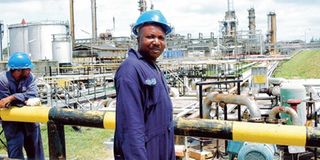The long road to oil riches for Kenya

The Kenya Petroleum Refinery Ltd plant at Changamwe, Mombasa. Photo/FILE
It will take Kenya at least six years to start crude oil production if a Chinese firm strikes commercial deposits in a well drilling exercise that starts next week.
China National Offshore Oil Corporation (CNOOC) will spend $26 million to drill the 5,000-metre deep Bogal-1-1 well in block nine near Merti in Isiolo North District in an exercise that will take five months.
Hydrocarbons Management Consultants on Wednesday said caution is required if the firm finds oil as it needs to drill more wells to quantify the fossil fuel deposits before developing production facilities.
“Kenyans should not expect to see immediate results if CNOOC and its partner Africa Oil Corporation of Canada strike oil,” said Hydrocarbons lead consultant Robert Shisoka.
He said a lead time of six years is a global standard to undertake resources development appraisal, building of a pipeline and refinery among other facilities before commercial crude oil production starts.
Mr Shisoka said in an interview with the Nation on Wednesday that the country needs to place itself in a strategic position by fast-tracking upgrading of the Kenya Petroleum Refinery Ltd (KPRL) to process various crude oil grades.
Prime Minister Raila Odinga has been spearheading efforts to place Kenya in such a status given that the country is a gateway for export of Uganda and Southern Sudan’s oil resources.
Mr Odinga has already held negotiations with the Chinese Government for Southern Sudan to export oil through Kenya.
From the talks, it is expected that China will fund building of a pipeline and refinery among others facilities.
Feasibility study
Uganda has discovered commercial deposits of oil in Lake Albert Rift basin and is carrying out a feasibility study to build a refinery with a capacity of 150,000 barrels per day at a cost of $2 billion.
National Oil Corporation of Kenya (Nock) said various benefits will arise if the country concludes negotiations to be the export hub for oil produced in the two countries.
“Kenya will benefit through employment creation and charging of fees for export oil transported in the pipeline if the deal is concluded,” said Nock’s managing director Mwendia Nyaga.
Mr Shisoka said instead of building another refinery, Kenya has to speed up upgrading KPRL in four years to make it competitive and increase liquefied petroleum gas (LPG) production from the current 120,000 metric tonnes annually for domestic use as well as export.
He said the refinery is the only one in the Eastern Africa region and upgrading of the plant that currently produces LPG, petrol, diesel, kerosene and fuel oil is projected to cost about $450 million.
“On upgrading, KPRL will be able to process inferior waxy crude oil from Sudan, Iran and Saudi Arabia to top notch Murban and Zakuum crude sold by Abu Dhabi National Corporation,” he said.
Energy permanent secretary Patrick Nyoike in July this year said Essar Energy Overseas Limited will carry out feasibility studies to determine the actual cost of upgrading the plant.
He said the study is to be done by the Indian company in the first six months of 2010.
“Essar has acquired 50 per cent of shares of the refinery and wants the entire plant’s crude oil refining capacity of 4 million metric tonnes per annum utilised on completion of upgrading,” said the PS.
The Government of Kenya owns 50 per cent of KPRL while Essar acquired 17.1 per cent shares of Shell Petroleum Company Ltd, 17.1 per cent of BP Africa Ltd and 15.8 per cent of Chevron Global Energy Inc that the three multinationals put up for sale in 2007 through Wood Mackenzie of London.
Purchase deal
Essar’s Group chief executive Prashant Ruia said the purchase agreement signed in July is part of a two-pronged strategy aimed at enhancing the firm’s global footprint and realising its dream of a refining capacity of one million barrels per day.
“We will be able to substantially add value to other global markets as well with our products. We are extremely obliged and thankful to the Government of Kenya for their support and look forward to working with them to make KPRL a global market leader,” he said.
KPRL has two refinery complexes with distillation, hydro-treating, catalytic reforming and bitumen production units.
Crude oil from the Middle East is transported by sea to Kipevu oil Jetty in Kilindini harbour and carried by pipeline to the refinery at Changamwe.




